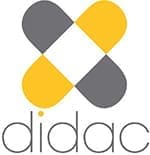Business Administrator
Apprenticeship Level 3
| Occupations | |
|---|---|
| Office Administrator | ✔ |
| Administrative Assistant | ✔ |
| Data entry clerk | ✔ |
| Project assistant | ✔ |
| Personal assistant | ✔ |
| Document controller | ✔ |
| Level | |
|---|---|
| Level 3 - equivalent to A Level | ✔ |
| Advanced workplace skills | ✔ |
| Advanced Vocational skills | ✔ |
| Advanced workplace behaviours | ✔ |
| Training Locations | |
|---|---|
| Employer's facility | ✔ |
| Getting started | |
|---|---|
| January, May & September | Starts |
| Training places subject to caseload capacity | Please enquire |
| Geographic locations - some restrictions apply | Please enquire |
| Training Access & Support | |
|---|---|
| Access Didac's eLearning Portal | ✔ |
| One-to-one training sessions | ✔ |
| Regular reviews with your trainer and employer | ✔ |
| ePortfolio - to record training & development | ✔ |
| Opportunities to improve your maths & English skills | ✔ |
| Duration | |
|---|---|
| Minimum of 12 months, typically 15months | ✔ |
| Funding - England | |
|---|---|
| Government Funding | ✔ |
| Funding Value | £5,000 |
| Employer Contributions | £500 |
| Age grants for employers - England | |
|---|---|
| Under 19 Apprentice - 3 months | £500 |
| Under 19 Apprentice - 12 months | £500 |
| Occupational Standard | |
|---|---|
| Business Administrator | |
| Wales, Scotland & Northern Ireland | |
|---|---|
| Please contact us for commercial options | |
Business Administrator
Apprenticeship Level 3
A business administrator’s role is to support and engage with different parts of the organisation and interact with internal or external customers.
Business administrators develop key skills and behaviours to support their own progression towards management responsibilities.
With a focus on adding value, the role of business administrator contributes to the efficiency of an organisation, through support of functional areas, working across teams and resolving issues as requested. The flexibility and responsiveness required allows the apprentice to develop a wide range of skills.
The business administrator is expected to deliver their responsibilities efficiently and with integrity – showing a positive attitude. The role involves demonstrating strong communication skills (both written and verbal) and adopting a proactive approach to developing skills.
The business administrator is also expected to show initiative, managing priorities and own time, problem-solving skills, decision-making and the potential for people management responsibilities through mentoring or coaching others
Business administrators have a highly transferable set of knowledge, skills and behaviours that can be applied in all sectors. This includes small and large businesses alike; from the public sector, private sector and charitable sector. The role may involve working independently or as part of a team and will involve developing, implementing, maintaining and improving administrative services. Business administrators develop key skills and behaviours to support their own progression towards management responsibilities
With Didac’s training experience in team leading and supervisory roles, we can create stimulating training plans to cover specialised operating situations.
Click the Add to Enquiry button below to find out more by registering your interest with us. You are not committing to anything.
Specification
| Accreditation | |
|---|---|
| Delivery |
You must:
- be 16 or over
- not already be in full-time education
- live in England to qualify for Didac funded apprenticeships
You can start an apprenticeship whether you’re starting your career, want a change or you’re upskilling in your current job. You can have a previous qualification like a degree and still start an apprenticeship.
As an apprentice you’ll:
- learn and train for a specific job
- get paid and receive holiday leave
- get hands-on experience in a real job
- be given the opportunity to improve your maths and English skills
- study for at least 20% of your working hours off-the-job
- complete assessments during and at the end of your apprenticeship
- be on a career path with lots of future potential
The apprenticeship will help you develop your knowledge and skills in the following areas
Skills
- Information Technology
- Record and document production
- Decision making
- Interpersonal skills
- Communications
- Quality
- Planning and organisation
- Project management
Knowledge
- Your Organisation
- Value of their skills
- Stakeholders
- Relevant regulation
- Policies
- Business fundamentals
- Processes
- External environment factors
The apprenticeship will help you develop the following behaviours
Professionalism – Behaves in a professional way. This includes: personal presentation, respect, respecting and encouraging diversity to cater for wider audiences, punctuality and attitude to colleagues, customers and key stakeholders.
Adheres to the organisation’s code of conduct for professional use of social media. Acts as a role model, contributing to team cohesion and productivity – representing the positive aspects of team culture and respectfully challenging inappropriate prevailing cultures.
Personal qualities – Shows exemplary qualities that are valued including integrity, reliability, self-motivation, being pro-active and a positive attitude. Motivates others where responsibility is shared.
Managing performance – Takes responsibility for their own work, accepts feedback in a positive way, uses initiative and shows resilience. Also takes responsibility for their own development, knows when to ask questions to complete a task and informs their line manager when a task is complete. Performs thorough self-assessments of their work and complies with the organisation’s procedures.
Adaptability – Is able to accept and deal with changing priorities related to both their own work and to the organisation.
Responsibility – Demonstrates taking responsibility for team performance and quality of projects delivered. Takes a clear interest in seeing that projects are successfully completed and customer requests handled appropriately. Takes initiative to develop own and others’ skills and behaviours.
The administration role may be a gateway to further career opportunities, such as management or
senior support roles.
You may also like…

Polli Morrow
We hired Ray Fearon from DIDAC woodworking academy to come to our Men’s Shed to teach us safety in our workshop. He was an excellent instructor. Thorough, knowledgeable, approachable and a person one could approach to ask any question. We learnt a lot from him and going forward we are passing that information to our members.



